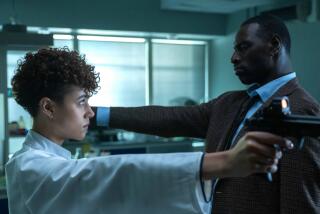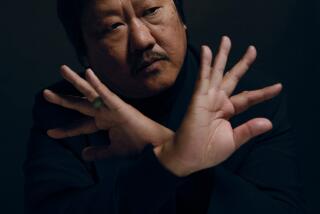Wilbur K. Woo dies at 96; a leader of L.A.’s Chinese community
- Share via
Wilbur K. Woo, a banker and produce merchant who first immigrated to Los Angeles in 1921, when he was 5, and decades later became an influential leader of the city’s Chinese American community, has died. He was 96.
Woo, who also worked to strengthen trade relations between the U.S. and Taiwan, died Monday at his home in Monterey Park of complications from a stroke and pneumonia, his family said.
His son, Michael Woo, was the first Asian American elected to the Los Angeles City Council, in 1985. The Democrat’s largest campaign contribution, nearly $200,000, had come from a Republican – the elder Woo.
“I find myself moving more toward the center because of Michael,” Wilbur Woo told The Times on election night and said his son probably could not have won without his generosity.
“If I didn’t give him that money, I’m not sure he would have had a chance in this kind of race,” Woo said, referring to the hard-fought campaign. “I also think that is what a father is for.”
Woo’s political clout in Chinatown “afforded his son front-row seats at an ongoing performance that included the major actors in Los Angeles city politics” over a period of more than 30 years, Tritia Toyota wrote in her 2009 book “Envisioning America: New Chinese Americans and the Politics of Belonging.”
A longtime political fundraiser, Woo had been in charge of raising money for President Richard Nixon in the city’s Chinese community in 1972.
In 1978, The Times called Woo “one of the leading citizens of Chinatown.”
At the time, he owned Chungking Produce Co., a family business founded by his father that endured for 40 years; served as chairman of the board of the Chinese Times, a local newspaper with a national voice; sat on the board of the Summit Western Corp., which developed the Mandarin Plaza Shopping Center in Chinatown; and was president of the Chinese Chamber of Commerce.
He also was a vice president of Cathay Bank of Los Angeles, the first bank in the United States owned by Chinese Americans. Tired of rising early to work in the produce business, Woo turned toward banking and joined the institution soon after friends founded it in 1962, The Times reported in 1985.
“With a knack for community outreach, he played a central role in the bank’s growth over the next decade,” according to a biography by the UCLA Anderson School of Management. Woo and his wife, Beth, endowed the school’s Wilbur K. Woo Greater China Business Conference, which is held annually to discuss China’s role in the global economy.
“I’ve always felt I’ve been a sort of catalyst between the young and the old, the traditional and the nontraditional. I’ve seen a lot of changes in the Chinese community, and I think a lot of them have been for the good,” Woo said in 1978 in a Times article with the headline “The Chinatown Tourists Don’t See.”
Wilbur Kuotung Woo was born Dec. 12, 1915, in a village near Guangzhou in China’s southern Guangdong province. He arrived in Los Angeles as a 5-year-old with his parents, David Kitman Woo and Gim Nuey Dea. His father, who worked for a relative who owned an asparagus farm in the San Fernando Valley, moved the family back to China during the Depression.
When Woo returned to Los Angeles in 1940, he was a refugee from the Japanese soldiers who had invaded his homeland. He had left behind his wife, Beth, and two young daughters, Patricia and Janice.
During World War II, Woo worked as a translator in the Office of Postal Censorship. After the war, he earned a bachelor’s degree in business administration at UCLA. He had spent his first two undergraduate years in China at Lingnan College.
Life as a Chinese immigrant and foreign student was not easy, Woo later recalled.
“At UCLA, which is in Westwood, at that time I could not rent a room because of the color of my skin,” Woo said in 1996 in AsianWeek. “I had to live in downtown Los Angeles and commuted to school every day.”
He was not reunited with his wife until 1946, when the couple rebuilt their marriage after a lengthy separation that “wasn’t easy,” Woo said.
The couple had three more children, Michael, who would spend eight years as a councilman before giving up his seat to run for mayor, losing to Richard Riordan in a runoff in 1993; Elaine, who is a Times staff writer; and Pamela, whom the couple refused to institutionalize when she was diagnosed with Down syndrome.
With his wife, children and parents, Woo moved into a home in Monterey Park in 1962 and started receiving anonymous phone calls threatening death if his Chinese American family did not leave the neighborhood.
After Woo called the police, officers were briefly stationed at his home and neighborhood patrols were strengthened. The harassment of the Woo family led to the formation of Monterey Park’s first Community Relations Commission, Woo said in a 1999 interview for the book “Ethnoburb: The New Ethnic Community in America.”
His wide range of business, political and cultural interests included serving as founder and chairman of the California-Taiwan Trade and Investment Council and president of the Chinese American Citizens Alliance.
He also was an overseas Chinese representative to the Taiwan Legislature and a member of the Overseas Chinese Affairs Commission, the California World Trade Commission and the California Commission for Economic Development.
In 1996, Woo became the first Asian American to receive the Neil H. Jacoby International Award, given by UCLA’s International Student Center to an individual who has endeavored to enhance relations with other nations and their respective cultures.
Charles Young, then UCLA’s chancellor, said in a statement in 1996: “I cannot think of anyone more deserving and who better represents what this award is all about than Wilbur Woo.”
Woo’s daughter Janice died in 2008.
He is survived by Beth, his wife of nearly 75 years; three daughters, Pat, Elaine and Pam; son Mike; six grandchildren; and seven great-grandchildren.
A public memorial service is planned.
More to Read
Start your day right
Sign up for Essential California for the L.A. Times biggest news, features and recommendations in your inbox six days a week.
You may occasionally receive promotional content from the Los Angeles Times.




















































